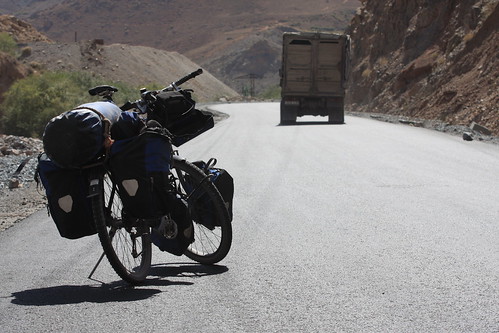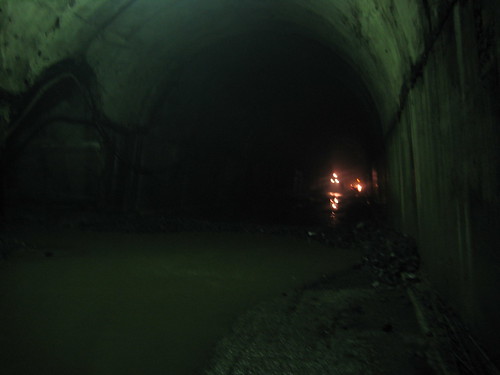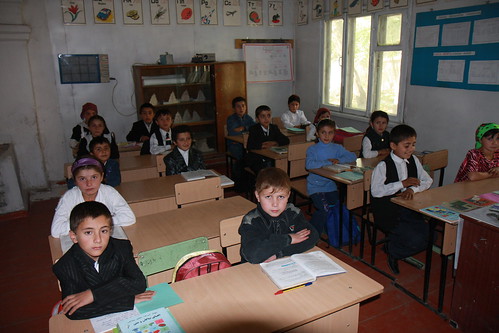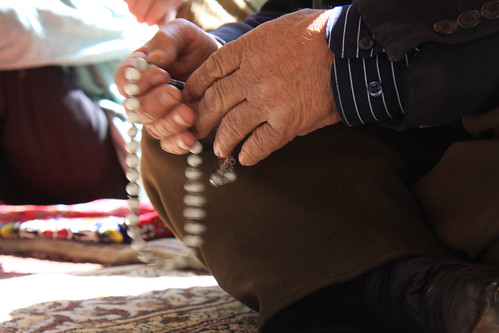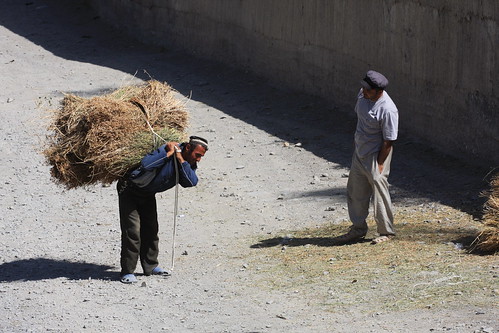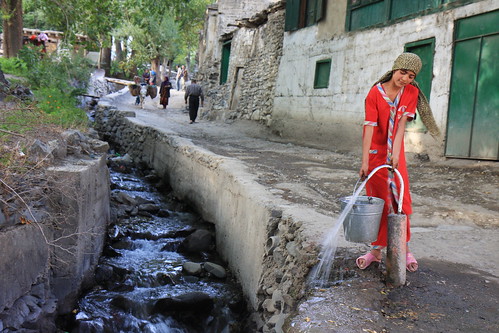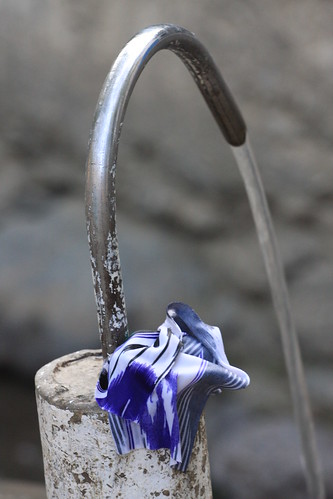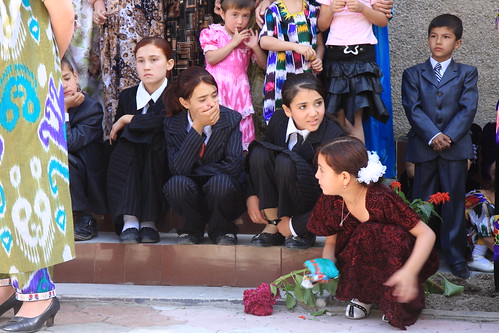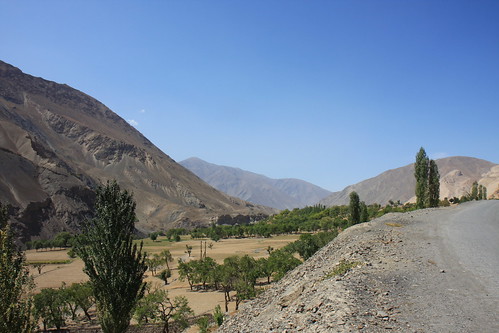Day 173 (Tajikistan): Dushanbe (visa games yet again?)
daily distance: 25km
total distance: 10,359km
riding time: 1-2h
After a good night’s sleep and a quick breakfast with Sonja and Heike I set out to head to the regional office of German Agro Action here in Dushanbe. We looked at the city map and found a street which was way down south. Guess that’s where I had to go. At least it is a bit closer to where I have to head eventually. Once there, I was in the right street (asked a range of people), but couldn’t find the place. I called Nodir and he confirmed my hunch. “You’re in the wrong part of town. Go back to where you were.” The area hadn’t looked the place, too many drab old apartment buildings and too much of an industrial area. Alright, all the way back uptown and uphill. Once at the meeting point with the local German Agro Action staff I met a British tourist who couldn’t quite believe that I had biked here from Germany. Turns out that he worked for Lonely Planet. I asked him whether by any chance he knew where to get a hold of a copy here. Ian takes his backpack off, opens it up and hands over his copy. Figures that he could do without or ask someone else he is traveling with. Thanks a bunch, Ian.
I eventually arrived at the office and the passport handing over game started. And then the waiting. Remember that the decision over whether I had to pay a $400 fine was still outstanding. I couldn’t do anything but wait. Updated the website and so forth in the office and around mid-afternoon Akmal came back, said everything is settled: Kyrgyz visa - check, Pamir permit - check, Tajikistan registration - check as well. With that out of the way I can now head to where I want to and apart from China (if I want to get an extension), I don’t really have to worry about visas and the like. Hoooray to that.
The staff at the office here are just as great as the people in Ayni - a big thank you to them. I spend some time over dinner with other development workers from other organizations and was then invited by the head of German Agro Action to spend the night at their place (unbeknownst personally as she was out on business - in Veshab) and was greeted very warmly by her partner with whom I had a good long conversation about Tajik idiosyncrasies and some realities of the place.
September 12, 2008 No Comments
Day 172 (Tajikistan): Ayni - Dushanbe (up the hill and through a tunnel)
daily distance: 135km
total distance: 10,334km
riding time: 9-10h
I left Ayni early in the morning, though not quite as early as I had hoped. I made it across the bridge that was to be closed soon after though and started hacking away at the distance. I wasn’t quite sure whether I would be able to reach Dushanbe in one day or not - and took let’s just see what happens approach.
The first 17km were awful - the road being torn up / destroyed again. Not much fun and on top of that too many trucks moving at my pace blasting fumes and smoke my way. Some Chinese construction workers were in the mix again, this time clearly cordoning off the road. One of them took a lot of interest in my book Moby Dick and started reading out the words.
The area was breathtaking and after the 17km the road became good again for a while. You continue to follow a gorge - and sadly I went into a pretty harsh headwind. Are those ever going to stop?
Just after passing Anzob (the village that is), the road starts to become mighty steep. And rough again. Chinese trucks seemed to be racing up and down the mountain, except for one who saw me being covered in dust when the guy in front of hm passed me - and stopped. A slight bow on both sides (as much as possible on a bike while trying to balance on a steep gravel road) and I thought I would never see him again. I would meet up with him twice. He soon overtook me again and stopped. We chatted (well, sign language that is) and it turns out he is from Urumqi, is a biker and pedaled 4000km through China at one point. So he was quite stoked to see me.
Further lots of steep uphill until the road leveled a bit before becoming steep again towards the tunnel of Anzob. I had heard many stories about this one, water waisthigh and the like and I figured I would see what happens once I got there. Well, it was the Chinese truck driver again - with a bunch of his colleagues. Mr. Nice Guy is the one on the right.

More chatting before I finally saw the tunnel. And water there was.
Plenty of it - so much so that the tunnel will be closed tomorrow for a month or so. I was told that I couldn’t go and so forth, but figured that I would try … and it wasn’t as bad as people made it sound. You stick to the side of the road and the water - though cold - is not as deep. The worst I had was kneedeep. In those parts, I pushed the bike rather than pedal through. You couldn’t see much really even with my headlamp, which I eventually turned off. The light in the tunnel was in the end sufficient and my initial concern that there were too many fumes in the tunnel were allayed when I saw construction workers hacking away on something on their machines.
After 5km I emerged on the other side … only to find gloomy skies and colder weather. The road was rough again, only some patches had been sealed and more Chinese construction crews were working on tunnels. But it entirely escapes me what the purpose of building them all at once is. It means that you have to go around all of them, which in turn means rough roads and complete loss of momentum.
Roughness can also be described by this … one of the screws holding my rear rack rattled loose and was bent 90 degrees, something I could fix without a big problem by putting in new one, but it shows how rough things were on the upper part of the downhill. Once you hit the blacktop things are smooth and I decided after a while to push all the way into Dushanbe where I arrived just after nightfall.
Sonja, friend of a friend of a friend (thanks Bettina, thanks Bianca - the latter I don’t know myself, for the contact) let me crash at her place and so all was well. Thanks a bunch.
September 11, 2008 No Comments
Day 171 (Tajikistan): Veshab - Ayni ($400 fine???)
I paid a visit to the school in the morning before heading out. The elementary school had just been refurbished with the help of the German embassy and German Agro Action. The before and after pictures were a telling sign. We had little time only as we were heading back by car (didn’t want to bike down the same bad road), but it was good to talk to the children for a bit. I wished I had had more time with them and would have been able to talk to them longer. But that would have required a much longer visit.
It was then back to Ayni - a harrowing ride in a car. I felt much safer on my bike really. The rest of the afternoon I spent trying to update the website, that being blocked by power outages and low line speeds.
This is also the day when I found out that I may have to pay a $400 fine for registering late. This is a bit of a nuisance, but I couldn’t have done it even had I wanted to. All offices were closed. Hopefully we can work something out. We decided that it wouldn’t be worth taking a cab to Dushanbe and instead that I would be heading there tomorrow so that I am there on Friday morning. Keep your fingers crossed that all works out.
September 10, 2008 1 Comment
Day 170 (Tajkistan): Veshab (lots of new impressions)
I should have headed back to Ayni today, but decided to stay for another day to get a better impression about Veshab, spend a bit more time here to talk to people and have a look around. It ’s not simple to summarize the impressions I had during the day. Where to start and where to end?
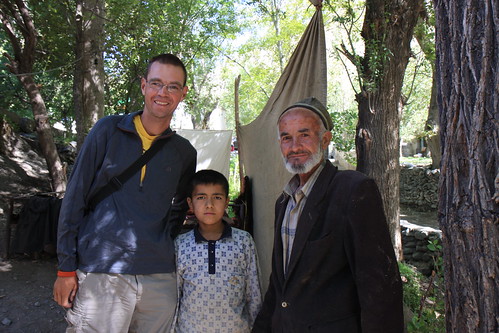
Poverty happens on so many levels and different from what we conceive it to be so often. There are no kids that are ravished by hunger to be seen here. But it is the kind of poverty that is extremely substantive and which is very telling about the lack of all things essential.
We started the day with a visit to the local hospital. But I wanted to speak with a doctor and not just look at a hospital. So we talked for a good long while. There isn’t much there. The doctor reports that in the winter time it is hard to maintain even basic services as it is simply too cold at -25C and there is no real heating happening. And she treats almost 20 people per day - including roughly 60 births per year. Which struck me as a lot of kids for a town the size of Veshab. It also points to part of the problem. Overpopulation - combined with rather scarce fertile ground, which explains a lot about the projects that German Agro Action is running here. They are apparently simple projects, but again they are telling: projects that involve courses about preservation of fruit - something that may have been known before, but many of the fruits spoiled because people didn’t know how to do this properly.Another project includes the usage of crops without fertilizer as well as making better crops available that are then shared with others in and outside the village. I talked to one villager who said that he was initially skeptical when he heard about it and was uncertain about the claims being made in the mandatory training that was carried out beforehand. He now says that his fields yield 300% more crops.
In the afternoon, I headed out to take a closer look at the water pipeline. The person responsible for it came long and explained that the villagers are seeing a major difference in their everyday lives and that their health has tremendously improved. And that other villages are thinking about building the same system. It is not free of course and with the (very low) payment they are able to do the maintenance work that is necessary. It’s a very basic construction, but has tremendously improved the life of people here. And for me, this picture almost says it all.
The same person is also a teacher and told me about his extremely low salary, he makes $60 / month. This is a high salary for a teacher and younger teachers make a lot less. Somewhere around $20 / month. They also have to pay a substantial amount for their university education and have no chance of living off of their salary. Which means that they either have to work additional jobs or, as is increasingly the case, there are no longer people willing to do the job. It just isn’t worth it. Something I can very well understand. And there really is no solution for that problem.
At the end of the day we sat down at the village square - and more of the problems became apparent. The complete lack of electricity for 7 months of the year is a major issue. This is not limited to Veshab, but is a countrywide problem. The villages don’t get electricity for the majority of the year. And in the long hard winters this is a major issue. People run generators to power their basic needs. But that is not a way any of us would really want to live and is only a meager solution. The other pressing problems were additional water resources for irrigating plots of land on the other side of the river, protection from landslides and educational issues.

The visit was in a lot of ways an eye-opening experience for me. And I am glad I came. People came to me without demanding anything. They looked for understanding of the situation, for why they are thinking about leaving to Russia to work there and send money back. This creates its own problems of course. The men leave to make money, leaving the families - i.e. mothers and children - to do all the work at home. Apart from the social problems, it creates downward pressure to fulfill the role that the father then leaves behind. It is not a pretty situation at all when countrywide more than 30% of the adult men are no longer here. This is made even worse in a country which is strongly patriarchic.
For me, the projects carried out here in Veshab never struck me as excessive - all of them were carried out in a way that made a lot of sense to me. They were sustainable without involving a massive amount of outside interference. And I didn’t mention all of them here. But I am convinced that the money spent here is well-spent. So, again, please consider donating.
Some of you have asked me for my Paypal information as international transactions are still a bit of a hassle. I will respond to this individually - and forward the money to the account of German Agro Action in Germany.
September 9, 2008 No Comments
Day 169 (Tajikistan): Ayni - Veshab (it’s well worth it)
daily distance: 47km
total distance: 10,199km
riding time: just under 4h
Today was the day. I would be heading to Veshab after all, the town that the charity ride is for. I was anxious to go there, but because there was yet another independence day coming up tomorrow, there is another holiday today, so the center of town was closed and we couldn’t go together. Interesting celebration for sure … everyone could say something, the Chinese construction worker crew representative, all the town’s important people, someone from Iran stressing the good ties and common heritage and many loud musicians.
After all was said and done we were able to set out. The packs were put into the car that was going up before me (didn’t really see the need to make the ride more difficult) and after the initial photos being taken I was on my own until just before Veshab. The area is beautiful … though I am sure the winters make for a rough environment. The mountains are high and forbidding, the valley narrow. There are only few patches to grow anything and all of those areas are being used it seems. The remaining areas are occupied by the villages. It never seizes to amaze me where people live and that they don’t move elsewhere - but family ties here are strong and so people stay.
The road to Veshab was rough and it took me a good while to get there. It also climbs over a great many cliffs and at the end of the day, I clocked almost 1000m in altitude over a distance of just under 50km on mostly rocky roads.
The valley seemed to be lasting forever and the further I went the more stretched out the road seemed to be. It was a lot of fun though and with each passing village I knew I was getting closer. And then I saw something: a group of cyclists who were apparently waiting for me to accompany me the last couple of km into the village.
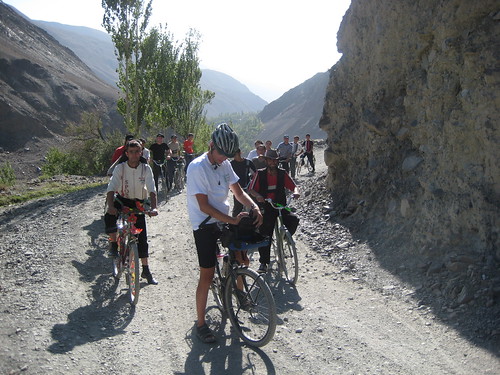
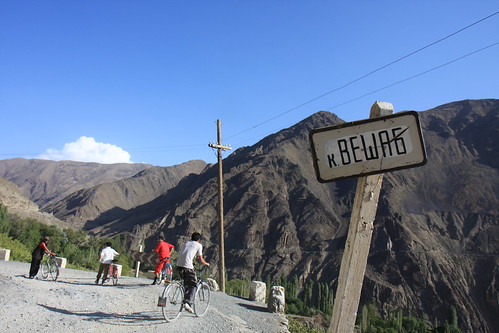
It was great fun riding together with about a dozen or so people and we were greeted by no less than 100 villagers. Just before getting there I kind of reminisced about the last 5 or 6 months and what was going on and why I was doing this. But soon enough I was torn out of these thoughts. We arrived in the village. Kids were saying rhymes in German (kind of cute), salt, bread … the works. I had to tell stories about the trip and where I was going and why I wanted to come to Veshab.
After the initial hello we were welcomed in one of the villager’s home, had something to eat and eventually I had a look around, many people eyeing me curiously - though well aware of who I was and what was going on. This isn’t a tiny village in terms of numbers, there are almost 2,000 people living here. But there isn’t much space. Take a look for yourself.

As one person explained to me - it reminds him of a highrise. The houses are so closely built together, many people in too few rooms. To some extent this has to do with rock slides which, though rare, do happen here every year. The village stretches along the bank of a river which was used for everything, including fetching drinking water. It wasn’t until German Agro Action proposed and implemented a seperate pipeline that people had safe drinking water. The number of infections dropped dramatically as I was told the following day - by putting in something that we take entirely for granted. And probably don’t even think about when we turn the tap.
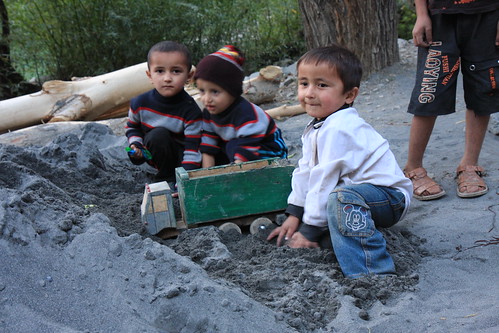
The night was dark. I woke up during the night and knew that the power would be out - another thing that makes life very hard here. But I mean out. No light except one flashlight at 3 am - someone wondering through the village. This may be OK during the summer time that the power is out for a few hours during the night, it is an entirely different matter though that for 6-7 months power is cut entirely in this and other villages. This has partially to do with political issues, but the people who do suffer are not the high and might. But what else is new?
PS: I would love to bring you many more pictures from Veshab, but slow upload speeds even here in Dushanbe make this pretty much impossible. My apologies. My hunch is that this won’t change for a while as I will be heading into more and more remote territory. There are more pictures of today at the flickr site though.
September 8, 2008 1 Comment

 Deutsche Version
Deutsche Version



